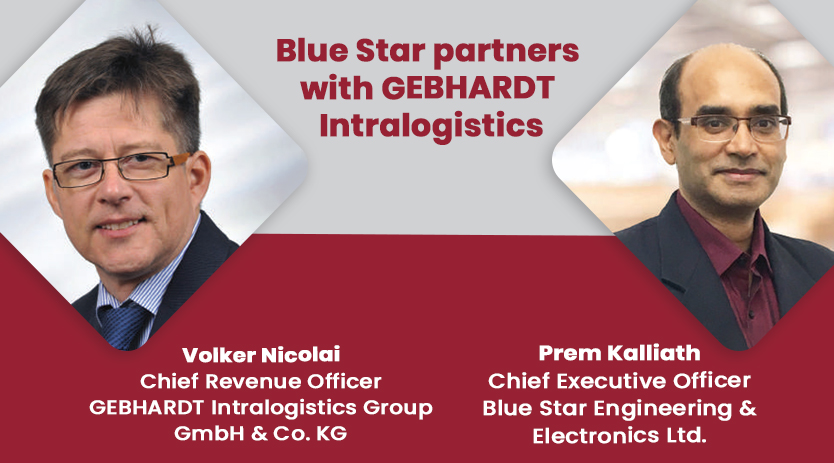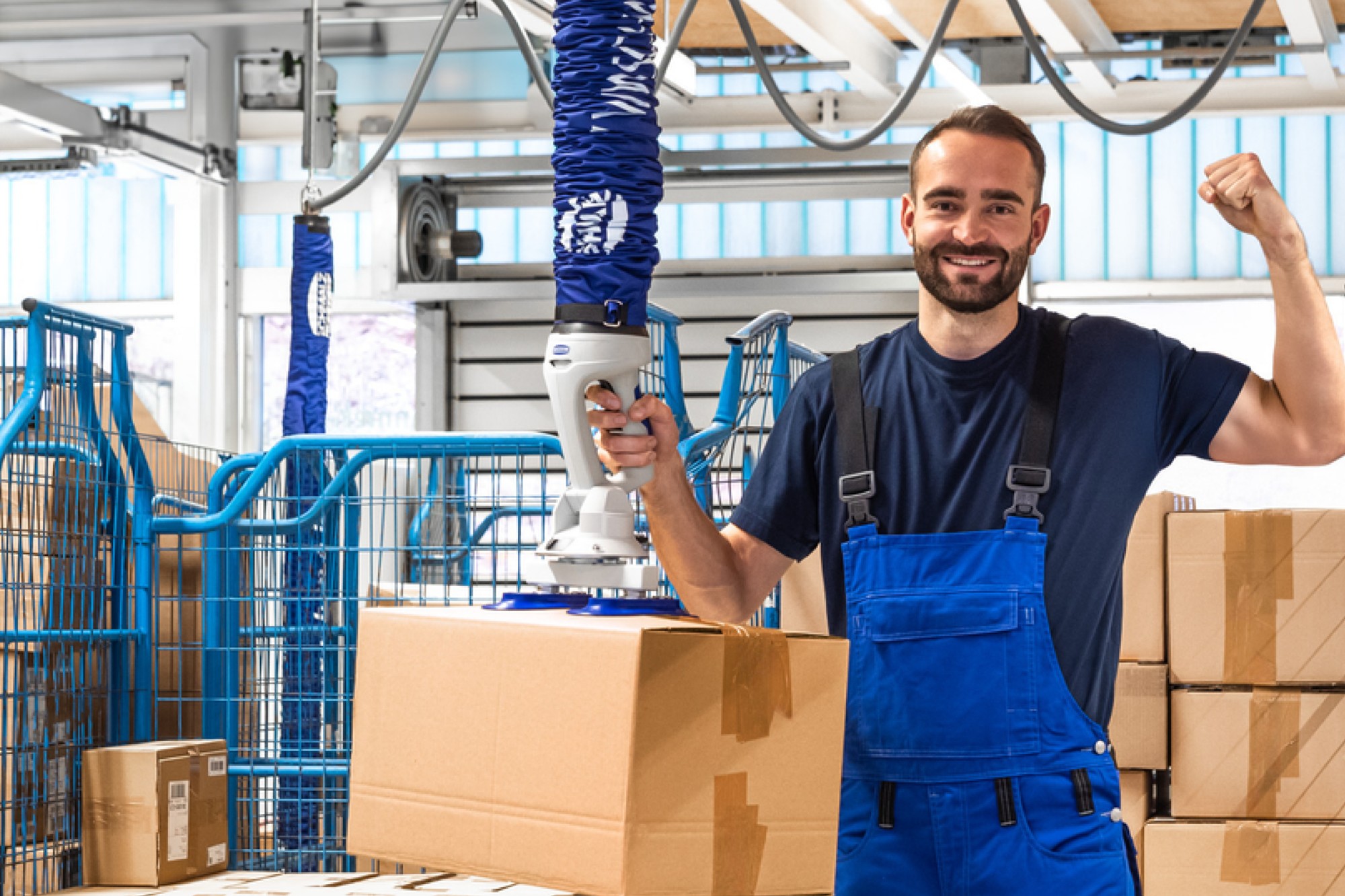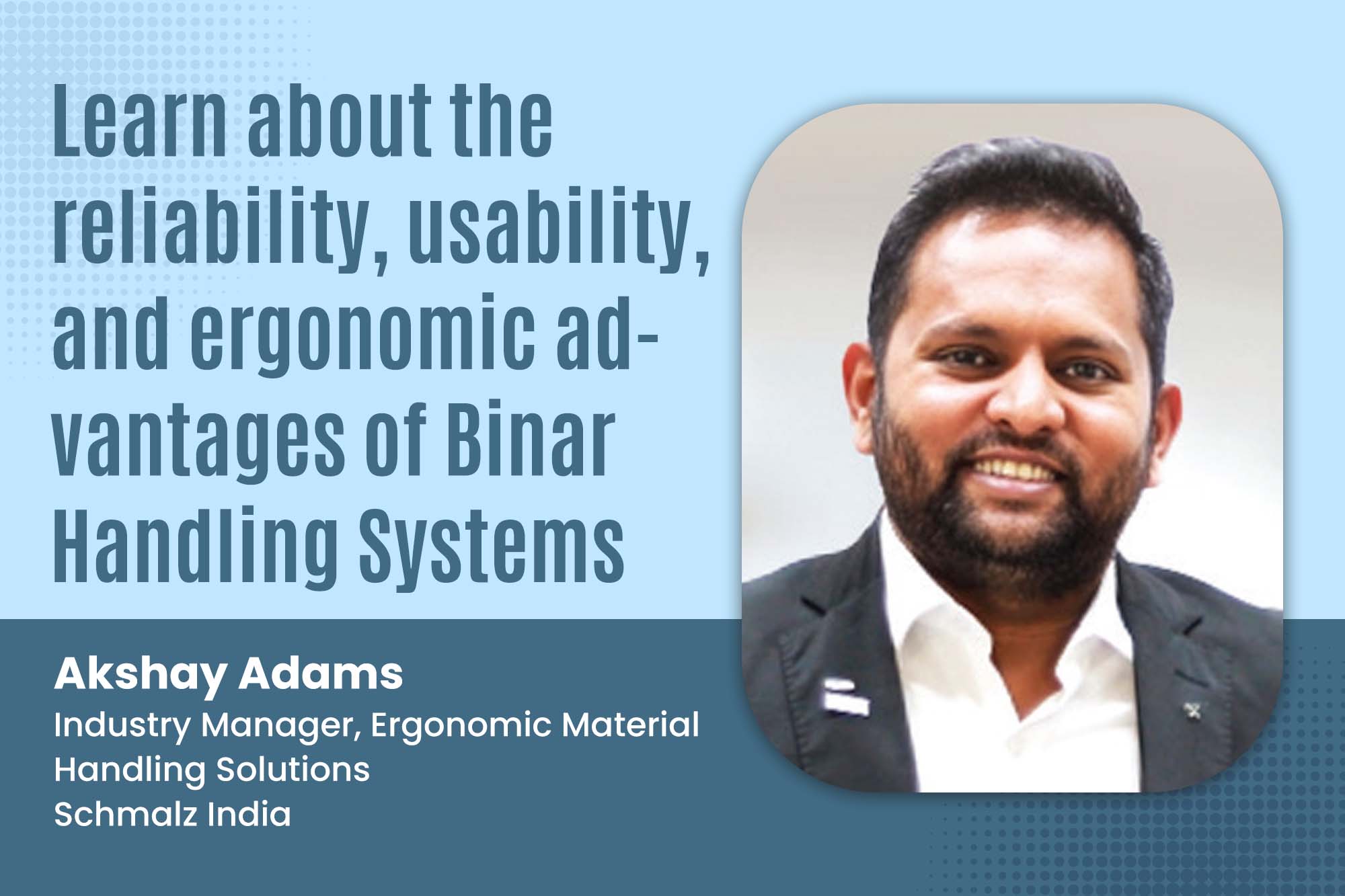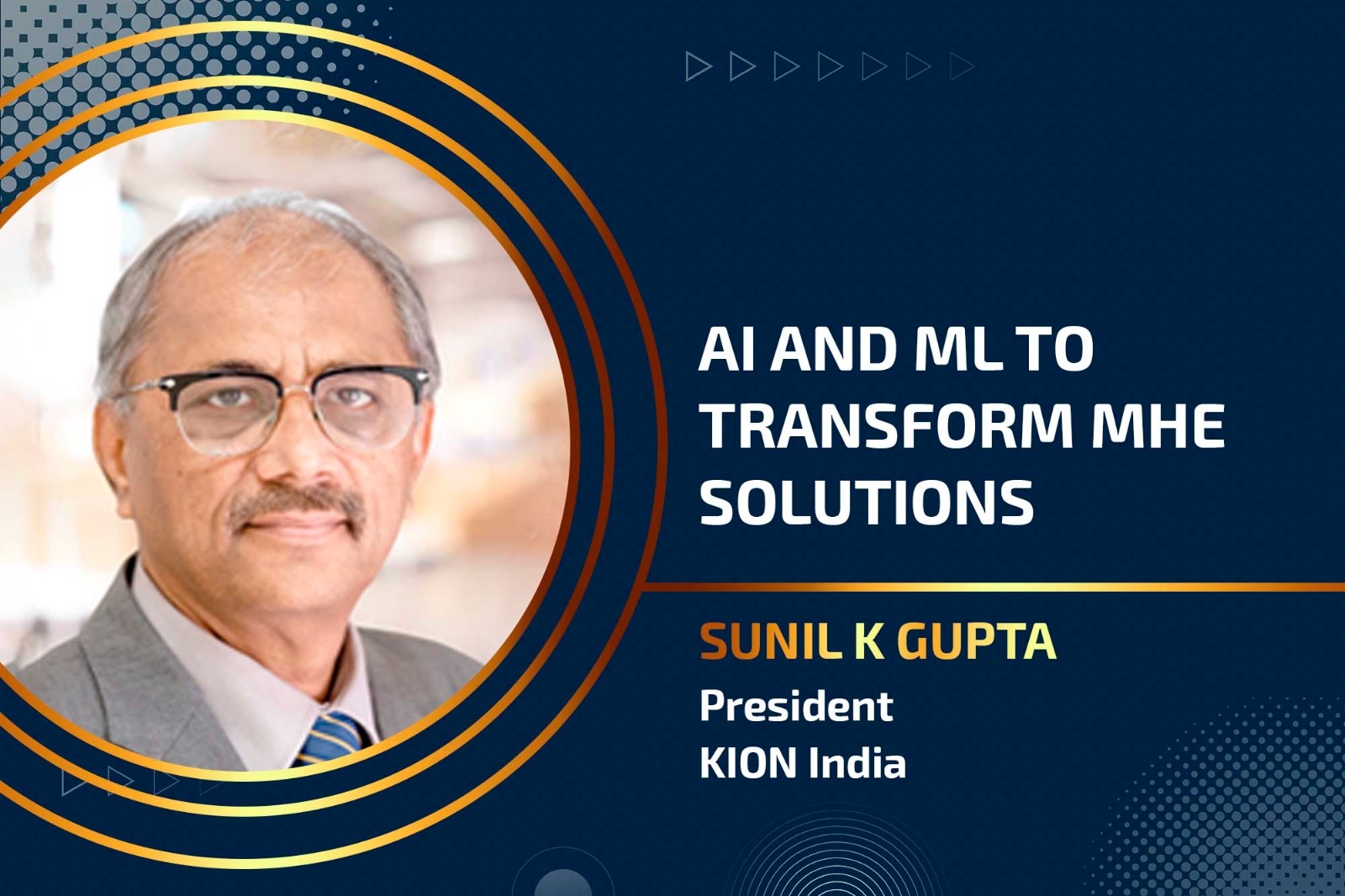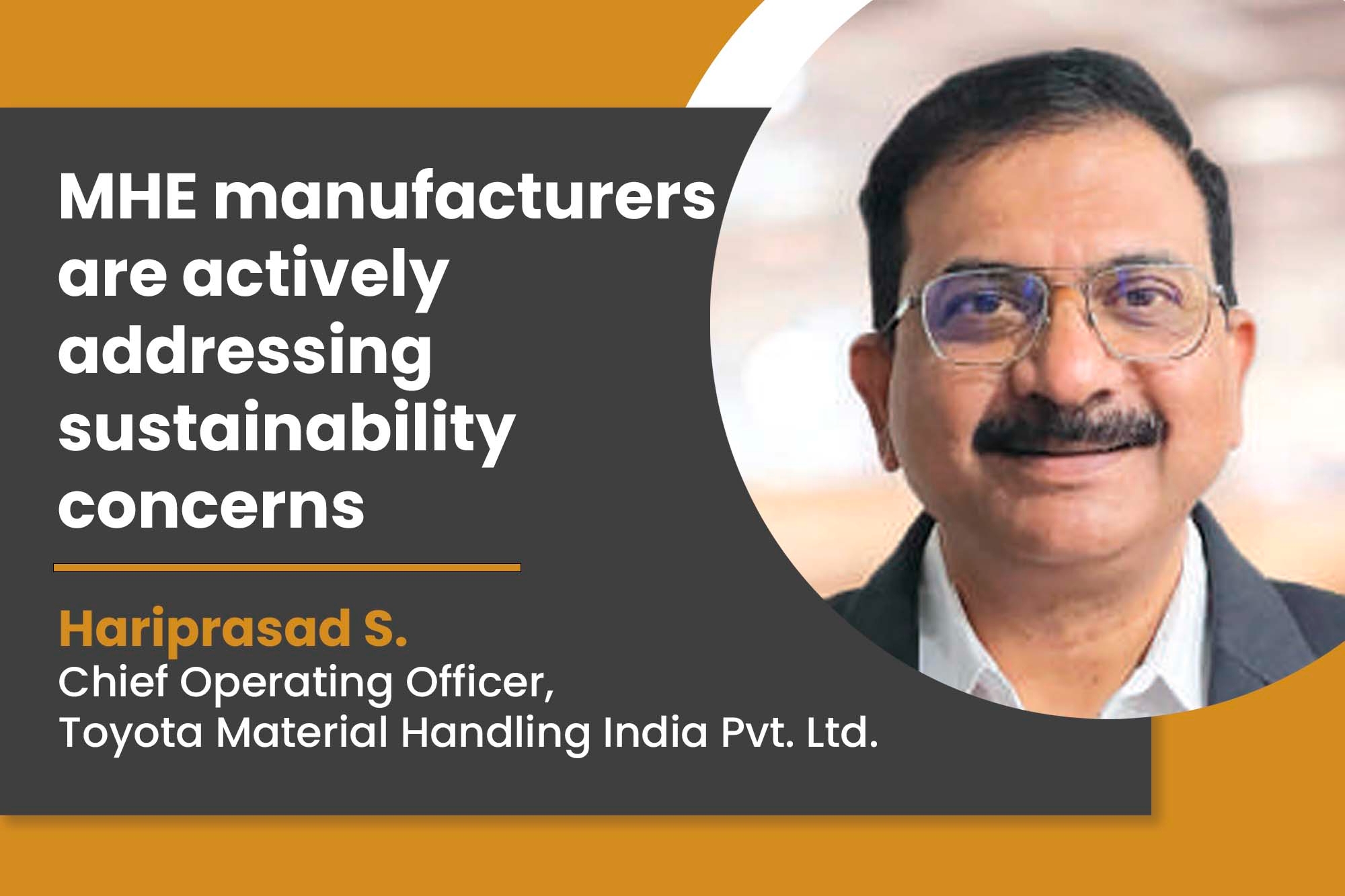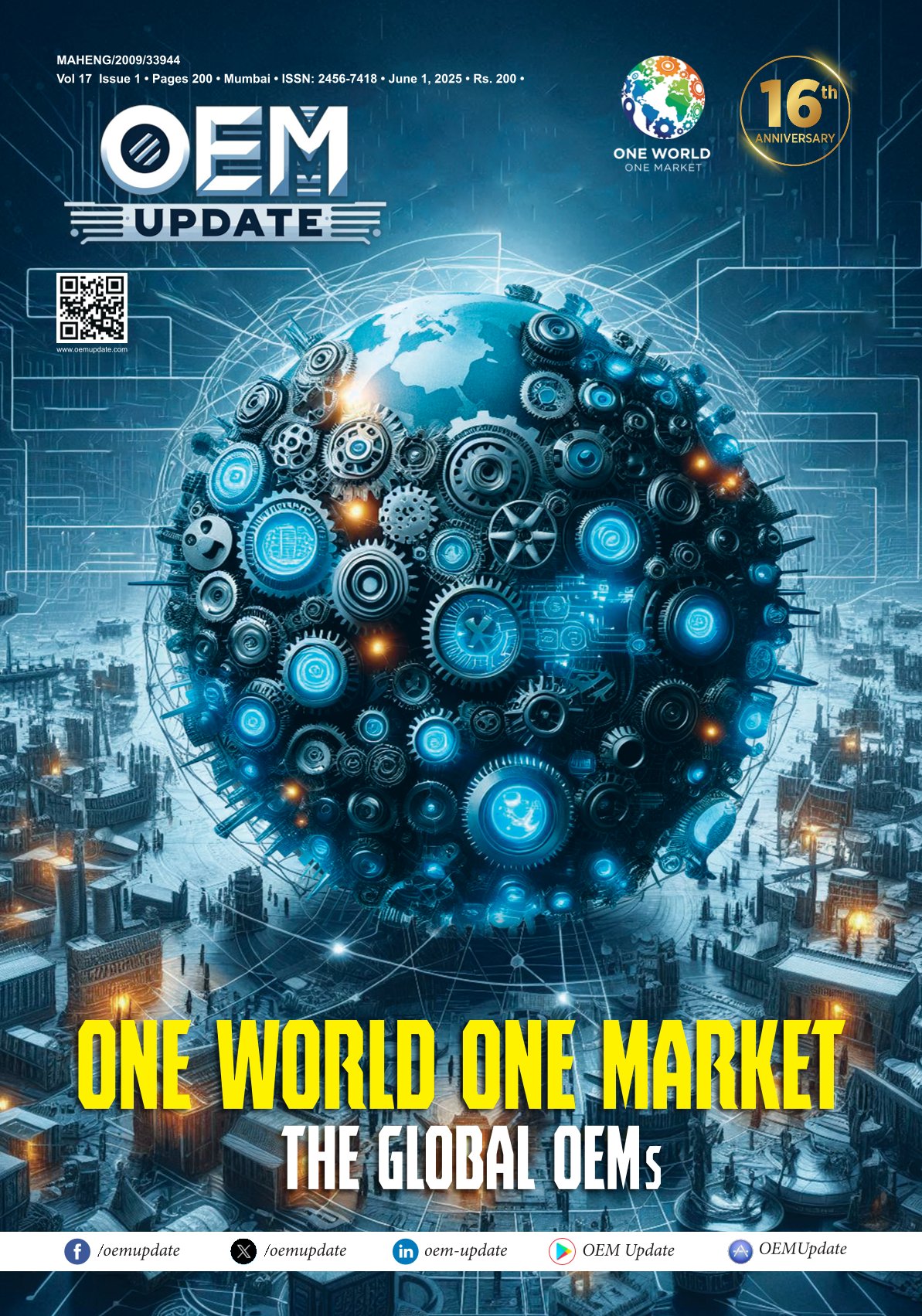Blue Star partners with GEBHARDT Intralogistics
By OEM Update Editorial November 23, 2023 11:28 am IST
Volker Nicolai, Chief Revenue Officer of GEBHARDT Intralogistics Group GmbH & Co. KG, and Prem Kalliath, Chief Executive Officer of Blue Star Engineering & Electronics Ltd., discussed their partnership to explore the Indian market and the potential opportunities while providing customised solutions for customers.
What specific industries do you see as particularly promising?
Prem Kalliath: The Indian market is currently at a suitable stage of development, marked by substantial investments in both the upstream and downstream sectors. This presents a promising landscape for solutions tailored to the unique demands of various industries.
Focusing on sectors where Blue Star has substantial expertise, we see significant potential in the automotive parts industry due to the opportunities it offers. Another industry on our focus is food and beverages, which stands out because of its intricacies and the diverse range of products it deals with. Pharmaceuticals offer another avenue for growth, encompassing everything from drug production to specialised manufacturing. This segment is evolving with the emergence of E-pharmacies and direct-to-consumer models, demanding automation solutions where we have experience.
Our primary focus lies in delivering tailored solutions specifically designed for the industries. This customisation process considers throughput requirements, SKU complexity, and storage conditions to provide a comprehensive solution. These solutions can encompass a wide spectrum, ranging from smaller-scale projects within a warehouse, possibly in a more compact setting, to larger implementations within manufacturing plants. Additionally, we are equipped to handle substantial distribution centres as well. These sectors have been strategically chosen as they offer promising opportunities, and we possess the necessary knowledge and experience to excel in them.
How is automation set to address the industry’s shift towards customer-centric operations?
Prem Kalliath: Across various industries, there is a shared commitment to getting closer to the end consumer, whether through direct-to-consumer channels or via retailers. This customer-centric approach is a top priority for many organisations. Automation is poised to play a pivotal role in this shift because it addresses the inherent complexities in managing many SKUs, handling diverse orders, and meeting heightened expectations for order-to-delivery timelines. The focus has shifted from days and weeks to mere hours.
These three critical areas—complexity management, order fulfilment efficiency, and rapid turnaround times—are where we anticipate automation can make a substantial impact, especially in the food and beverage sector. Similarly, automation is indispensable in the automotive parts industry, particularly within the vast aftermarket and parts-related segments. With numerous models and thousands of SKUs, automation is essential for efficient management.
How is the entire system managed efficiently?
Prem Kalliath: Our primary focus is to address the logistical challenges that our customers encounter within their supply chains. We specialise in streamlining the various processes around the receiving and dispatch of goods within warehouse facilities. We offer a comprehensive suite of solutions within this realm, encompassing automated storage, palletising, de-palletising, and sorting. We provide all the essential tools required for optimising warehouse operations.
We focus on providing the right kind of customer-oriented solution. Having an intimate knowledge and understanding of the Indian market while also having more than 30 years of experience of working with customers across industries, we are well placed to understand the requirements and challenges and come up with solutions which meet their requirement. Secondly, we have always invested in skilling and training our own people, in terms of engineering, solution designing, technology, which has helped us in being able to produce solutions which are implementable in the Indian context.
Furthermore, our portfolio encompasses automated truck-loading solutions, which have become increasingly critical as businesses strive to boost their throughput and operational efficiency. This strategic link between warehouse operations and transportation ensures a more expedited and efficient movement of goods. In essence, we facilitate the seamless management of incoming & outgoing materials within the warehouse and all the associated processes related to warehouse distribution.
What is the primary focus and role of your operational model?
Prem Kalliath: Our operational model is distinct in that it revolves around engineering and solution design, areas we have complete control over. We possess the expertise to meticulously engineer and design solutions tailored to our clients’ needs. Additionally, we collaborate with the right vendor partners to assist in manufacturing the required components. Integration may occur on-site or at a designated location, depending on specific project requirements.
Our primary role is that of an integrator. We specialise in assembling and coordinating the various parts and components to create a seamless and efficient system. We recognise numerous capable part vendors in this ecosystem, but the missing piece often lies in the integration aspect. We act as the integrator, focusing on engineering, solution design, quality control, and effective project management.
All the solutions are capital intensive and typically when anyone invests in these solutions, they expect to receive services for the 10-15 years in the future, and that’s where with our network, expertise, experience and with our capability to provide service across the country, differentiates us in the market.
Could you provide a detailed insight into your vision and expectations for the future?
Prem Kalliath: Significant opportunities are emerging in the market, particularly with the increasing focus on expanding manufacturing capacity. The expansion is not limited to new Greenfield plants but extends to Brownfield facilities as well. One aspect that’s often overlooked is the enhanced utilisation of vertical space, especially in existing Brownfield plants where expanding horizontally might be challenging. Encouragingly, many companies are now exploring ways to maximise the use of vertical space. Given these evolving opportunities, it’s ideal for us to come together in partnership and actively participate in these developments.
Volker Nicolai: In spare parts, our typical application involves a comprehensive system encompassing various components. This includes a conveying system responsible for transporting materials from the goods-in area to storage locations, whether these are automated or manually operated. Additionally, we provide a picking system that efficiently retrieves the necessary parts from the warehouse to fulfil customer orders. This system consists of mechanical elements, such as conveyors, storage technology, and software components.
For instance, when a dealer submits an order for multiple parts, these items are often stored in different areas within the warehouse. To streamline the process, we implement conveyors to facilitate the movement of parts from one location to another, ensuring that they are eventually consolidated and prepared for central dispatch. This system has been successfully deployed in various locations, including countries like the UK, France, Italy, Spain, and the United States, primarily catering to the spare parts business. Mercedes-Benz is one of our notable clients.
Could you elaborate on your primary focus in implementing tailored solutions in India?Volker Nicolai: Over the past five years, the demand for our services has substantially increased, largely driven by the surge in e-commerce activity. This growth is not limited to Europe but extends to the United States and India. The Indian market has transformed similarly to Europe’s, with significant investments in production optimisation and IT systems.
There remains significant untapped potential in warehousing and supply chain management. The level of automation suitable for India may not necessarily mirror what’s prevalent in Europe. Therefore, we collaborate closely with our Indian partners to assess customers’ specific needs and determine the most cost-effective automation solutions.
Our primary focus is on implementing these tailored solutions in India, aligning them with the unique requirements of the market. We believe there are abundant opportunities to make significant strides in this endeavour, given the evolving landscape of the Indian market.
How do your initiatives align with the principles of Industry 4.0, and how do they impact your product offerings?
Volker Nicolai: We take great pride in our strong focus on Industry 4.0, and our dedication has been recognised with awards in Germany. Our owner, Mark Gebhardt, has been honoured by Ernst and Young for his entrepreneurial achievements in Industry 4.0 and digital transformation.
One of our standout contributions to this field is our innovative software tool, Galileo IoT. This tool employs specialised sensors on machines to monitor their condition. It collects data on power consumption, vibration, temperature, and other parameters. We analyse this data using artificial intelligence to gain insights into the system’s status. The primary goal is to detect potential issues and prevent interruptions or faults, such as identifying abnormal power supply levels. This proactive approach minimises downtime and allows us to move away from fixed maintenance schedules, like six-month or yearly intervals, to perform maintenance as and when required. This is a classic example of Industry 4.0 in action, leveraging artificial intelligence to enhance efficiency.
Furthermore, we harness smart glasses, such as Google Glass, to assist maintenance teams in fault detection. Additionally, we create digital twins of systems, which are simulation models used for making changes, testing strategies, and reducing commissioning time. These digital twins enable us to conduct software testing and simulations in advance, saving time and resources.
How does your ASRS system streamline the distribution, and what makes it cost-effective?
Volker Nicolai: An Automated Storage and Retrieval System (ASRS) is pivotal in diverse applications, such as e-commerce distribution centres. In a recent project for healthcare and beauty goods, the ASRS handles a multi-step process. Goods arrive on pallets from suppliers and are categorised into different SKU classes, including high runners, medium-sized runners, and low runners. High runners are efficiently picked using a “pick by light” system or flow racks, while medium-sized runners are managed similarly. An automated storage system stores these items for the less frequently picked low runners due to lower throughput requirements in a high-bay warehouse.
When a specific SKU is needed, the ASRS retrieves it and brings it to a workstation. An operator takes the required quantity, and the remaining items are seamlessly returned to storage. Orders are then consolidated, and the picked items are grouped with other SKUs in preparation for transportation. A multilevel shuttle system is employed to facilitate replenishment for flow racks and pick-by-light systems. A consolidation step is essential for orders exceeding three or four tons before dispatching them to the packing area.
This complex process involves a combination of technologies, including conveyors, storage machines, and a centralised system that orchestrates and manages all operations efficiently. The ASRS proves to be cost-effective, highly flexible, and adaptable to various order structures and requirements while maintaining a high level of throughput and operational efficiency.
What sort of traceability solutions are available in the automation solutions?
Volker Nicolai: Traceability in our operations relies on standard methods like barcoding and the use of RFID technology. Barcodes are widely utilised, where each item is assigned a unique barcode that barcode readers can scan. In contrast, RFID technology offers distinct advantages due to its capacity to store more data directly on the tag, making it possible to extend traceability beyond certain system limits. While barcodes often require database access for detailed information, RFID can directly retrieve data from the RFID.
Both technologies have their merits, and their choice depends on the specific application. Barcodes are straightforward, reliable, and suitable for many scenarios, while RFID stands out when advantages such as extended data storage are crucial. Our approach involves careful analysis of each situation and its demands to determine the most fitting traceability solution.
Cookie Consent
We use cookies to personalize your experience. By continuing to visit this website you agree to our Terms & Conditions, Privacy Policy and Cookie Policy.



